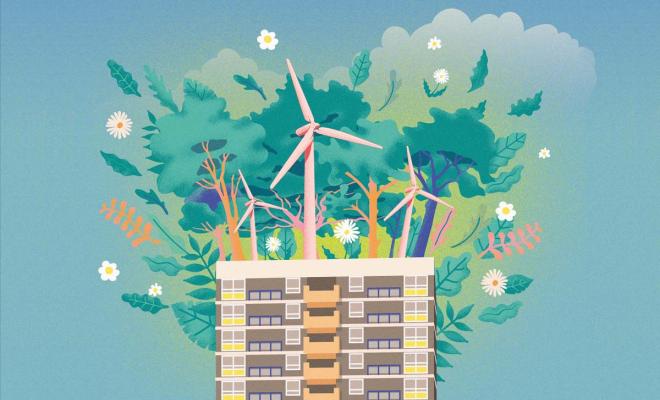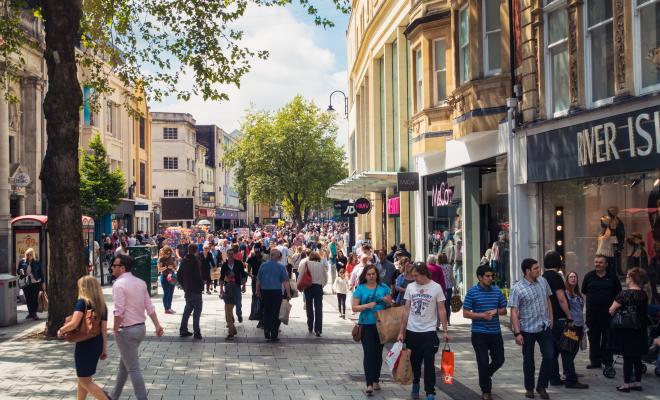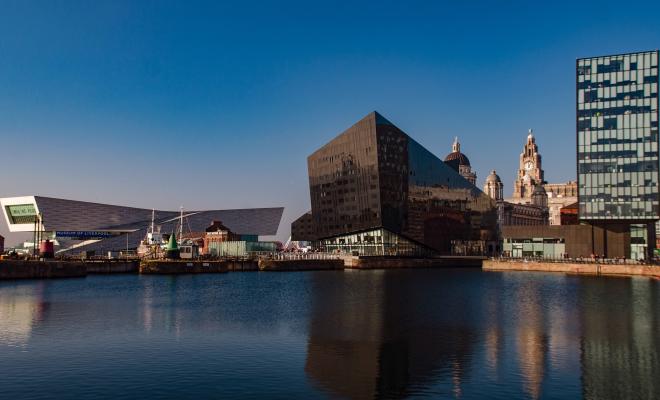20 Sep 2024
Please note: South Lakeland District Council has since merged into the new Westmorland and Furness Council in 2023, as did the former Eden District Council and Barrow Borough Council.
How is Action 43 tackling the climate crisis?
Before merging into the new Westmorland and Furness Council, South Lakeland District Council’s business support initiatives supported businesses to be part of a growing low-carbon economy, with 3 business recovery initiatives:
1. Building on a longstanding relationship with Cumbria Action for Sustainability.
This charity delivers a range of services helping businesses improve their carbon literacy including workshops, advice, training, specialist consultancy services, and Cut Your Business Carbon online surgeries.
In 2019 Cumbria Action for Sustainability began supporting the town of Ambleside’s efforts to become a zero-carbon community. Through this work, the charity created its carbon footprint calculator, which calculates a business’s total carbon emissions and gives a detailed breakdown of which areas of operations are the highest emitting.
2. Launching a partnership with consultancy Green Small Business in October 2020.
This gave local businesses the chance to get subsidised environmental advice and 12 months of Green Small Business certification. The consultancy audits businesses’ environmental impact and drafts up tailored environmental policies for them.
South Lakeland District Council covered half of the fee companies would ordinarily pay, and a special offer meant the first 20 South Lakeland businesses signing up could register for a £50 rate instead of the ordinary £300 rate.
3. Subsidising the Purposeful Business Start-Up Programme.
This is a course run by local organisation Future Fixers. Since 2020, dozens of eco-friendly businesses have graduated from the programme. The programme gives people the skills and knowledge to run a green, ethical enterprise. The council’s backing meant the usual £495 fee was cut to £60 for South Lakeland residents (and the course is free for residents receiving unemployment benefits).
Westmorland and Furness Green Enterprise Hub
The work undertaken by South Lakeland laid a strong foundation for continuing to support local businesses as the new Westmorland and Furness Council. Under the new authority, merged resources and funding have enabled this support to be significantly scaled up through the newly established Westmorland and Furness Green Enterprise Hub, launched in January 2024.
Previous partners of South Lakeland are members of the Hub. Cumbria Action for Sustainability is the lead organisation responsible for running the Hub and Green Small Business continues to offer targeted 1:1 sustainability advice. New partners, including Lancaster University, Cumbria Tourism and Electricity North West, have also come on board.
The Hub is now the centrepiece of Westmorland and Furness’ evolving green economy work. It hosts training events and is also dispensing decarbonisation grants to local businesses so that they can act on the advice they’ve received. A pot of £200,000 is available for grants ranging from a few hundred pounds up to £10,000. The grant scheme proved immediately popular, receiving a large number of applications in the first few weeks.
“It is so important that we all play our role in helping to contribute positively to tackle the climate emergency. The Green Enterprise Hub is a fantastic opportunity to empower businesses and social enterprises to make the right choices, helping to unlock the benefits of a cleaner and greener future.”
Molly Hogg, Programme Manager, Cumbria Action for Sustainability
What impact has the project had?
Through these initiatives, a diverse collection of businesses across the district are more aware of environmental issues and are taking steps to become more sustainable.
In 2021 Cumbria Action for Sustainability had:
- Held a business support day in Ambleside for over 20 local businesses and organisations.
- Used its contacts to direct businesses onwards to further support, for example helping the Levens Village Shop and the Grasmere Victorian House Hotel bid for energy efficiency installations and grants.
- Funded the Solar Made Easy project, through which a trusted solar panel installer will work with small businesses in the South Lakeland area.
To date, over 25 businesses have engaged with Green Small Business. Success stories include:
- Helping Hart and Jackson & Sons Solicitors address energy efficiency in old Victorian premises. The legal advisors also aim to influence their own clients to work towards Green Small Business accreditation.
- Engaging with Land and Sky Media, a Kendal-based production company specialising in documentary film, photography and remote location media. Green Small Business worked through issues including travel emissions, and accreditation has given the company greater credibility with its clients.
- Supporting Broadoaks Country House hotel to implement cost-saving measures on their property, including energy efficient lighting.
Between 2019 and 2022, 56 businesses graduated from Future Fixers’ Purposeful Business Start-up Programme.
“We know that some of the changes we have made to our business are already having a positive effect on the environment...We meet with Green Small Business every year now to give them an update on what we have achieved and to get new and updated advice regarding any new schemes or technologies that we may wish to consider.”
Tracey Robinson, Co-owner at Broadoaks Country House
A springboard for further funding
South Lakeland District Council’s existing ecosystem of relationships with local businesses was a factor contributing to its successful bid to Innovate UK’s Pioneer Places Programme. Initially, South Lakeland was successful in bidding for funding for a feasibility study, which led to a subsequent successful bid for funding from Westmorland and Furness Council. £150,000 was secured for a partnership between the council, Cumbria Action for Sustainability and the University of Cumbria to address rural decarbonisation at scale.
Multiple local businesses have already signed on to the project as partners – from art studios to medical manufacturers to hospitality. It will deliver greater understanding of non-technical barriers to net zero, identify research needs, catalyse the development of new collaborative project ideas, and identify funding opportunities. It will also see the improvement of local policies and strategies to ensure progress towards net zero in a predominantly rural location.
South Lakeland’s positive historical track record on the green economy and business support shows how relatively small fund projects can be influential for attracting additional funding later down the line.
What made this work?
Joined-up approach and linking economy with environment
A key objective of South Lakeland’s Climate Change Action Plan was supporting businesses to become low carbon. Former council leader Giles Archibald signed ADEPT’s 5 Priorities for a Green Recovery from COVID-19, and priority 2 entails support for reskilling, retraining and research to accelerate the transition to a net-zero economy. To fulfil these commitments, the council emphasised the advantages that environmental consciousness and action bring to a business. These include improved viability, profitability, and attraction to customers and clients. Robust political support from a senior level has reinforced this message.
Connection to tourism
South Lakeland is one of the UK’s most popular tourist destinations, a place where small businesses have flourished because they're part of the character that appeals to visitors. People visit the World Heritage Status landscape to experience nature. If South Lakeland is to preserve this identity, green jobs and businesses have to be part of its future.
In 2021 the UK Prosperity Index found that South Lakeland had the best conditions for enterprise in the country. The council played a central role in nurturing this reputation.
A good relationship with the community
South Lakeland was keen to encourage localism by recognising expertise, empowering and trusting communities and individuals. This was a key factor in developing the partnerships that are now delivering change.
By outsourcing delivery to local organisations, the council avoided a top-down approach, reduced strain on stretched budgets and staff, and guaranteed that on-the-ground support meets local needs.
By engaging with multiple partners, the authority has produced a comprehensive package of business support with elements that complement, interact with and amplify each other. For the 3 original partners, this was a chance to build connections in the area, resulting in an emerging network of low-carbon South Lakeland businesses. This network has since expanded to cover all of Westmorland and Furness, and continues to grow.
South Lakeland’s work at a district level fed into wider regional grant funding such as the Low Carbon Lake District Grants offered by the Lake District Foundation, which have provided several opportunities to small businesses for green upskilling during the coronavirus recovery.
What resources were needed?
The council funded the package via its dedicated climate action budget, though it didn't demand huge expenditure. South Lakeland has demonstrated how a fairly modest council contribution can catalyse a wide-ranging impact.
Westmorland and Furness Council has secured £571,359 from the UK Shared Prosperity Fund for the Green Enterprise Hub up to 2025.
Cumbria Action for Sustainability
South Lakeland District Council has provided funding since 2014. In 2018 the council committed to a more regular £50,000 every year. In 2020/21 it made a one-off payment of an extra £50,000 (for a total of £100,000).
Green Small Business
The council committed to covering £150 of the standard £300 cost of Green Small Business accreditation for each business. This contribution was agreed on a flexible basis because demand was uncertain prior to rolling out. The council made the business case on the assumption of 10 businesses participating, equalling a council payment of £1,500. In the first year (2019/2020), uptake was slow with only 5 to 6 businesses taking part.
The following year, uptake was much higher due to efforts by the council to champion case studies from the previous cohort and increase exposure. Consequently, in 2020/21 the council’s contribution was around £3,000. Averaged out, the council’s expenditure was roughly £2,000 per year to support businesses to receive or renew accreditation.
Future Fixers
The council contributed £8,000 a year to run courses every 6 months, once in spring and once in autumn.
The running of each initiative was delegated to the relevant organisation, making it a relatively hands-free operation for the council. Besides ironing out a business case, very little time input was needed from officers, nor was it difficult for the package of support to receive formal approval.
Lessons from South Lakeland
The transition to a low-carbon economy must be done in a way that achieves multiple benefits which are tangible to local businesses and communities. Supporting SMEs (small and medium-sized enterprises) to go green is a way for local authorities to lead by putting a fairer, greener recovery into practice.
South Lakeland’s experience highlights the importance of promotion. The council publicised the various opportunities across its social media platforms to both its business and resident audiences.
The business arm of the council, Invest in South Lakeland, had a newsletter that went out specifically to businesses, whereas South Lakeland News newsletter goes out to residents via post – the initiatives were advertised regularly in both. However, the council suggested that more could be done to increase awareness and cross-promotion via word of mouth.
Small businesses are extremely time-pressed and therefore have less time to improve their green credentials. In response, both Green Small Business and Future Fixers emphasise that going green can boost profitability in an age when customers are increasingly valuing ethical business. Communications strategies must focus on this angle to get businesses on board.
“South Lakeland District Council’s support has made a massive difference to what Cumbria Action for Sustainability has been able to do. They have funded us to support both businesses and communities in South Lakeland and have done so over a number of years. We have a very good working relationship with them – both officers and councillors.”
Molly Hogg, Cumbria Action for Sustainability
“The support of South Lakeland District Council and now Westmorland and Furness Council for these projects reflects what we think is the importance of new green businesses in terms of what they’re going to do for our economy, our jobs and our high streets. Green jobs are not going to be a ‘nice to have’, they are going to be the driver of economic renewal.”
Matthew Williams, Senior Service Manager for Economic Development and Regeneration, Westmorland and Furness Council
“Supporting our communities and businesses to become more energy-efficient and environmentally aware is a key priority for South Lakeland District Council and it is important now more than ever for businesses to consider their impact on the planet and people. Businesses taking notice of their environmental impacts and actively managing them is the right thing to do and, indeed, working with the environment in mind can actually enhance a business’s viability, profitability and attraction to customers, clients and partners.”
Councillor Dyan Jones, Portfolio Holder for Climate Action and Biodiversity
Useful information
To find out more, contact:
- Molly Hogg at Cumbria Action for Sustainability – [email protected]
- Karen Bentley-Brown at Future Fixers – [email protected]
- Tim Maiden at Green Small Business – [email protected]
- Matthew Williams at Westmorland and Furness Council – [email protected]
Related projects
We've found some examples of other council activity on this topic.
- Derbyshire County Council has set up a Green Entrepreneurs Fund to help businesses cut carbon emissions.
- North Ayrshire Council has established a Green Jobs Fund so businesses can generate green and fair jobs locally.
Friends of the Earth's view
As well as tackling their own emissions, councils should encourage and support local businesses, residents and institutions to address the climate and nature emergencies. South Lakeland District Council did just that for local small businesses, linking to its aims for a green economic recovery from COVID-19. It’s good to see that the work hasn't only been continued by the new Westmorland and Furness Council but also scaled up. At a time of negative rhetoric about environmental action, it’s important to show the business opportunities in a low-carbon economy.
To deliver emission cuts across their area, councils will need to support and influence a range of partners. For example, councils should work with schools to tackle emissions in their buildings and catering.
Friends of the Earth is showcasing specific examples of good practice in tackling climate change, but that doesn’t mean we endorse everything that a council is doing.
This case study was produced by Ashden and Friends of the Earth. It was originally published in February 2022 and was last updated in May 2024. Any references to national policy in this case study relate to policy under the previous government and reflect the policy context in which the council was operating at the time.





